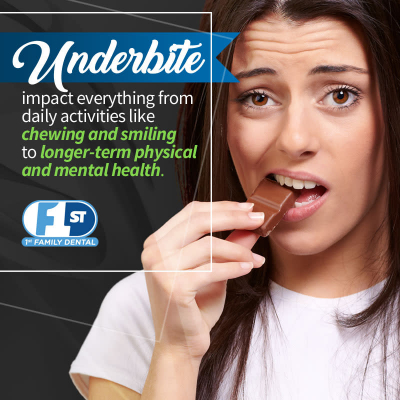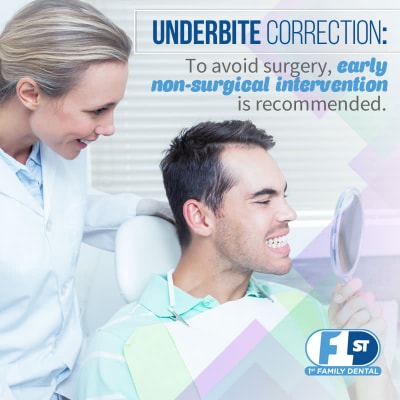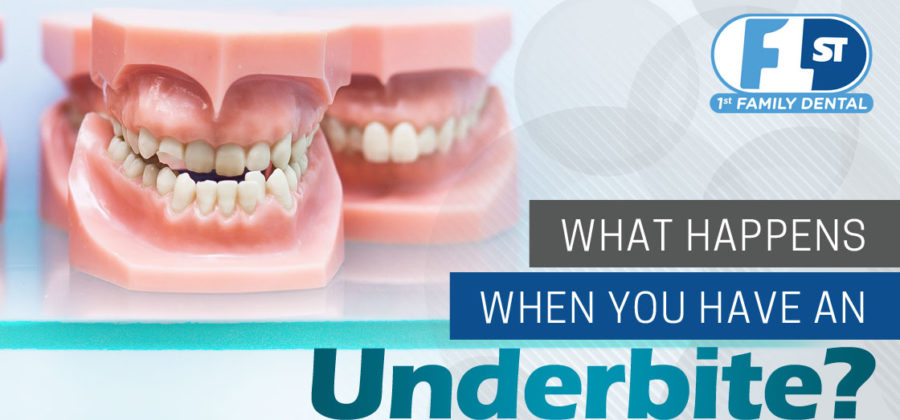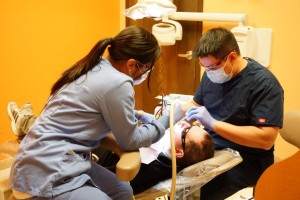No matter how well you take care of your teeth, there are certain dental problems that are caused by genetics and there’s nothing you can do to prevent them. An underbite is one of those issues.
However, just because you can’t prevent an underbite does not mean that you need to live with it for the rest of your life or let your lifestyle suffer as a result.
This post will cover what happens when you have an underbite? And treatment options available for correcting it.
An underbite occurs when a person’s lower jaw extends farther out than the upper jaw, creating an overly pronounced and protruding lower jaw. The level of misalignment ranges from barely noticeable to severe. Underbites affect less than 10 percent of the population, but for that 10 percent, daily encounters and long-term activities can be difficult.
Here is just a glimpse into what happens when you have an Underbite:
 Appearance: Because underbites are so much less common than overbites, people who have them tend to be noticed more and become self-conscious as a result. A protruding chin adds to this and can lead to people with underbites being ridiculed as children.
Appearance: Because underbites are so much less common than overbites, people who have them tend to be noticed more and become self-conscious as a result. A protruding chin adds to this and can lead to people with underbites being ridiculed as children.
Speech: The top and bottom teeth need to align in order to make certain sounds like “f” and “s.” When your teeth don’t line up, enunciating those letters can be difficult. This adds to the feeling of self-consciousness, especially during the adolescent and teenage years.
Smiling: A dominant lower lip leads to a droopy smile and can make it difficult to move the mouth into a “regular” smile. No matter what you try to do, your smile still looks like your bottom lip is out farther than it should be.
Chewing: A simple activity like chewing also becomes difficult when the teeth are misaligned. People with severe underbites are at an increased risk for choking because they can’t properly chew their food before swallowing.
Jaw Pain: Whether you realize it or not, your jaw is constantly working to try and align your teeth. When that doesn’t happen, it leads to increased pressure that causes headaches and jaw pain. People with underbites are also more prone to developing TMJ as a result of the added pressure on the jaw.
As you can see, underbites impact everything from daily activities like chewing and smiling to longer-term physical and mental health. Luckily, there are several treatment options available to bring the upper and lower jaw into alignment.
Correcting an Underbite
You might have heard that surgery is the only option for correcting an underbite. This is not the case. Surgery is considered a last resort when non-surgical options have been exhausted.
According to the ADA and a report published by Colgate, as with many dental issues, the earlier they can be addressed, the more successful treatment will be. The following underbite treatment options do not require surgery and can be performed entirely in our office:
 Upper jaw expander: A device called a Palatal Expander is placed on the roof of the mouth and widened each night as treatment progresses. Over time, this increases the size of the dental arch and brings the upper and lower jaws into alignment.
Upper jaw expander: A device called a Palatal Expander is placed on the roof of the mouth and widened each night as treatment progresses. Over time, this increases the size of the dental arch and brings the upper and lower jaws into alignment.
Reverse Pull Face Mask: This resembles the headgear you may have seen on people with braces. It wraps around the head and attaches to metal bands on the back of the upper teeth to pull the upper jaw forward so it’s in line with the lower jaw.
Chin Cap: This device wraps around the chin and lower jaw to prevent it from growing and expanding out even further. This is a good option for children or teens whose jaws are still being formed.
Braces and veneers: Traditional braces may be used to correct mild underbites. Veneers may also be placed on the upper teeth so that top and bottom teeth align. Again, this is only recommended for non-severe underbites.
If none of those options are feasible, an oral and maxillofacial surgeon can perform underbite correction surgery to manually bring your upper and lower jaws into alignment. Braces are typically required after surgery to keep the teeth in alignment while your mouth adjusts to its new configuration. Children are more likely candidates for non-surgical intervention because their jaws are still developing. Once the jaw becomes fully formed in adulthood, it becomes more difficult to correct bite issues.
Don’t Suffer in Silence
If you have an underbite, no matter how severe, our team at 1st Family Dental, along with our in-office orthodontic partners at Midwest Orthodontics Center, can help develop a treatment plan that will improve your quality of life and lead to a healthier mouth in the long run.
Orthodontic Services Provided by:
Contact us today to learn more about what happens when you have an underbite and how we can help correct it.
Join Us In the Comments!
If you have questions on What Happens When You Have an Underbite? Join us in the comments below!
Leave a comment





1 Comment
Leave your reply.